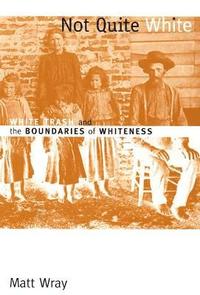
- Format
- Inbunden (Hardback)
- Språk
- Engelska
- Antal sidor
- 232
- Utgivningsdatum
- 2006-11-01
- Upplaga
- New
- Förlag
- Duke University Press
- Illustrationer
- 18 illustrations
- Dimensioner
- 243 x 162 x 19 mm
- Vikt
- Antal komponenter
- 1
- ISBN
- 9780822338826
- 468 g
Not Quite White
White Trash and the Boundaries of Whiteness
- Skickas från oss inom 5-8 vardagar.
- Fri frakt över 249 kr för privatkunder i Sverige.
Passar bra ihop
De som köpt den här boken har ofta också köpt Who's Afraid of Gender? av Judith Butler (inbunden).
Köp båda 2 för 1651 krKundrecensioner
Fler böcker av Matt Wray
-
White Trash
Annalee Newitz, Matt Wray
This collection is devoted to exploring stereotypes about the social conditions of poor whites in the United States and comparing these stereotypes with the social reality.
-
The Making and Unmaking of Whiteness
Birgit Brander Rasmussen, Eric Klinenberg, Irene J Nexica, Matt Wray
Bringing together new articles and essays from the controversial Berkeley conference of the same name, The Making and Unmaking of Whiteness presents a fascinating range of inquiry into the nature of whiteness. Representing academics, independent s...
Recensioner i media
"Matt Wray's Not Quite White is a richly textured social history of how and why the nation has come to conceive, categorize, and routinely vilify that part of its population known as 'white trash.' Because this subject has rarely been the focus of systematic scholarly inquiry, that alone would be a notable achievement. Yet the book aims for more-to propose a boundary theory of why 'white trash' has had so many uses-from literature to politics to social science. By any measure, this book is a major contribution."-Troy Duster, New York University "White trash? What did you just call me? Not Quite White provides the best social history of America's most quizzical moniker in the racial-class system. From its colonial origins to the era of eugenics to the public health campaign to eradicate hookworm in the South, Matt Wray's careful analysis documents the roots of this label, showing what its apparently oxymoronic nature tells us about the larger system of symbolic stratification in the United States."-Dalton Conley, author of Honky "[A]n engaging study. . . . the book is the result of ambitious interdisciplinary research examining multileveled, interactive processes of social differentiation in distinct historical periods. . . . Wray's work adds new depth to our understanding of the intraracial dynamics that construct and sustain ideologies of white supremacy and will challenge scholars to rethink their own constructs of what white means. Both the substance and methodology of this work will be of interest to professionals and graduate students in the social sciences and humanities. Selected chapters might also serve well in upper-division undergraduate courses." -- Pamela Perry * American Journal of Sociology * "Matt Wray's latest book, Not Quite White: White Trash and the Boundaries of Whiteness, is a compelling read. The prose is lucid and the analysis, which draws upon boundary theory and poststructuralist methods, most insightful. . . . [A] beautifully crafted, detailed and fascinating account." -- Anoop Nayak * Ethnic and Racial Studies * "The length of the book and an easily readable narrative style make it well suited for the undergraduate classroom. Students will find the book accessible; educators should appreciate its potential to stimulate thought-provoking discussion. . . . [T]his is a well-argued and thought-provoking book. It complicates scholarly understandings of what it has meant to be 'white' and succeeds as a model of interdisciplinarity." -- David J. LaVigne * Journal of Social History * "Wray's new book, Not Quite White, is a brilliant and original monograph that both expands and challenges Whiteness Studies, which tend to deal with an undifferentiated white ethnicity; Ethnic Studies, which largely omit class analysis; and Labor Studies, which are not interested in the phenomenon of poor whites . . . . The text is accessible to non-specialists and undergraduates along with scholars and graduate students. This would be a fine textbook for any number of courses." -- Roxanne Dunbar-Ortiz * Journal of American Ethnic History *
Övrig information
Matt Wray is Assistant Professor of Sociology at the University of Nevada, Las Vegas, and a 2006-2008 Robert Wood Johnson Health and Society Scholar at Harvard University. He is a coeditor of The Making and Unmaking of Whiteness; Bad Subjects: Political Education for Everyday Life; and White Trash: Race and Class in America.
Innehållsförteckning
Preface and Acknowledgements ix Introduction: White Trash as Social Difference: Groups, Boundaries, and Inequalities 1 1. Lubbers, Crackers, and Poor White Trash: Borders and Boundaries in the Colonies and the Early Republic 21 2. Imagining Poor Whites in the Antebellum South: Abolitionist and Pro-Slavery Fictions 47 3. "Three Generations of Imbeciles Are Enough": American Eugenics and Poor White Trash 65 4. "The Disease of Laziness": Crackers, Poor Whites, and Hookworm Crusaders in the New South 96 5. Limning the Boundaries of Whiteness 133 Notes 145 145 References 181 Index 211


